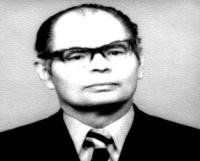We all were brothers on the front
Mr. Juraj Maďar was born on December 18th, 1919 in Vysoké village in Slovakia. In 1940, he entered the Slovak army. He underwent the six month training and then served as a radio operator at the Trenčín town airport. In 1944, he entered the Czechoslovak army as a radio operator in their headquarters. He personally met general Svoboda a few times and also participated in several explorative combat operations. He announced the liberation of Žilina town through the radio. He accompanied the Czechoslovak government from Žilina town all the way to Prague, where they arrived on May 9th 1945. After he retired from the army in fall of 1945, he lived in the Czech town of Brno. He worked there in the electrical industry for a while and then moved back to his home town in Slovakia. During the 50‘s and 60‘s he attended many school lectures, where he shared his war experiences and adventures. He was honored with the Bravery medal and is also the recipient of few other war awards.

